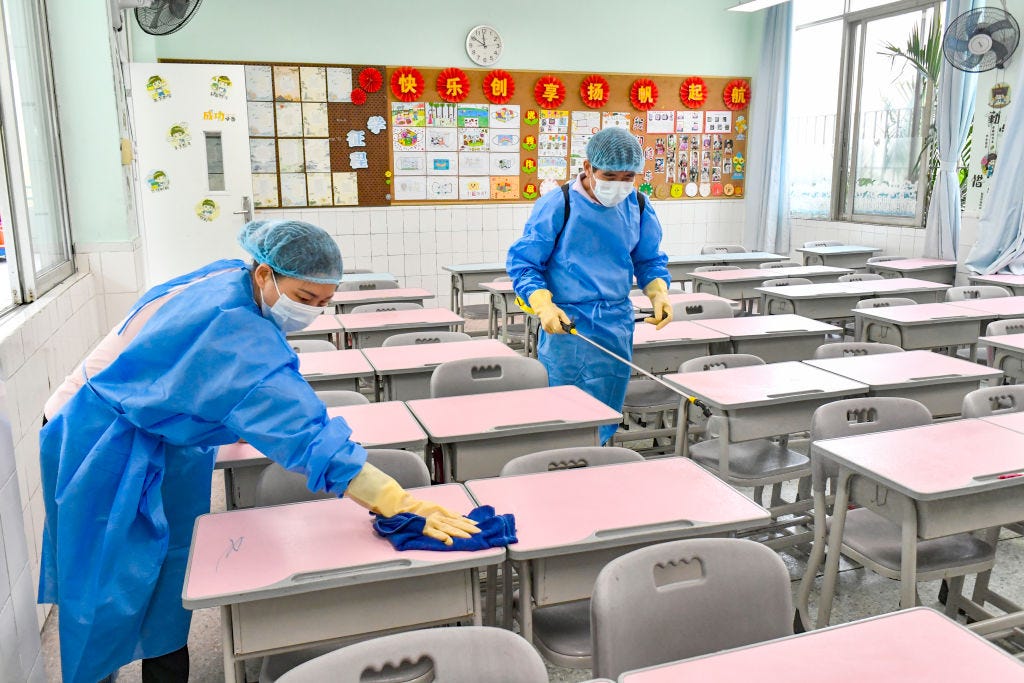In my first book, and in this newsletter, I’ve argued that schooling doesn’t really work to close relative academic gaps in the way people assume. When conservatives and neoliberal education reform types complain that public schools are failing to close relative performance gaps like the racial achievement gap, they’re assuming that this is a core element of education - not merely to increase the absolute knowledge of students but to bring them to parity with each other, more or less. I have laid out a long and extensively researched case that in fact we have no reason to believe that schools can perform this function:
But now we’ve had an unfortunate experiment in restricting student access to formal schooling thanks to Covid-19 pandemic closures and remote learning. This has, for one thing, revealed that remote learning is pretty damn shoddy, or at least monumentally hard to pull off. But it’s also prompted a number of people to tell me that it disproves my core claim - look, of course education works, we held kids out of school and had disastrous learning loss! With school, kids learned, without school, they didn’t. Doesn’t that prove that education works?
Not in the way I mean, no, and it’s pretty straightforward. Of course simply not giving students any education means that they will not undergo absolute learning. You can’t learn algebra if no one is teaching it to you. But that says nothing about whether it’s fair to expect teachers and schools to achieve relative gains for the lowest-performing and in doing so close academic gaps. You can keep every kid from learning anything about algebra and all will suffer, but once you start teaching them, individual differences between students will assert themselves, and some will learn more quickly and perform better than others. I know that because that’s what’s been observed in every educational context ever - some kids are just better at school than others. We have individual academic differences that assert themselves despite the best efforts of parents, teachers, schools, and policymakers. Nothing about Covid learning loss suggests otherwise.
Indeed, I’ve often said half-seriously that if you really want to close learning gaps, simply make it illegal for the highest performers to attend school. Even if a runner runs faster they can’t win a race if runners ahead of them get faster too.
If you assume for political reasons that all students are made alike and that you can just pour equal amounts of learning into the brains of different students (the analogy in Waiting for “Superman”), then you can attack teachers and their unions for performance gaps. If, on the other hand, you assume that each student has their own individual potential thanks to genes, environment, and chance, then you should expect exactly what we observe, which is that most students slot themselves into a relative performance ability band very early in life and stay in that performance band over time with remarkable stability. And if you understand that, the urge to excoriate our schools becomes rather ridiculous. Certainly you can wonder whether on the margins individual schools are getting the most absolute learning they can out of their students, and there are probably a small number of truly terrible schools out there that could do with reform. But in the main, I suspect that most students are rising more or less to the level of their individual potential, for self-interested reasons and thanks to the urging of parents and educators. It’s just that not everyone has equal potential. If we acknowledge that, the whole discourse about our supposedly-failing education system simply makes no sense. We’re asking schools to accomplish something we have no reason to believe they can accomplish.






I’ve worked in public schools for the past 18 years, and I can honestly state it’s never been so nuts as it is now. I have always been a big supporter of Freddie’s views on education, and loved the Cult of Smart. But I am honestly wistful for the bad old days of believing that every child can succeed, as compared to the woke pessimism I see around me.
Since the pandemic, my district has become obsessed with DEI to the point of distraction.
I have been to nearly 20 hours of DEI in services, and 0 on providing remedial math and literacy instruction. I have been provided hours of pre-made lessons on racial and gender identity, but have struggled to get my principal to authorize an order for a reading curriculum that addresses the 6 components of literacy.
My district has been very conscious in adopting activist language, but it’s all window dressing. Our head of Special Education opened the year by committing to end White Supremacy, then transitioned seamlessly to how we would address this by using standardized naming conventions when uploading signature pages from IEP meetings.
I’m on board with everything in this column, but for the love of God we need to teach kids to read, and I am honestly afraid to express this opinion at my job
I guess we missed out on a perfect opportunity to put Freddie's theory to the test.
We should have made the 'smart' kids suffer through remote learning, and let all the other kids attend school in person. This may have actually closed the achievement gap.